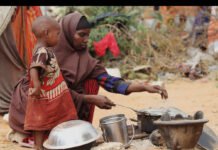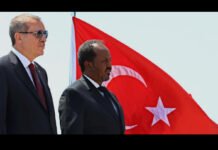By Horn Africa News
A growing controversy over the fate of public land in Somalia has ignited heated debate among intellectuals, activists, and displaced communities. The land in question was originally allocated during the administration of the late President Mohamed Siad Barre for social service institutions, such as schools, health centers, and other public facilities.
However, after the collapse of the Somali state in 1991, these lands—left without protection or oversight—were occupied by civilians fleeing conflict from various regions of the country. For more than three decades, displaced families have made homes on this property, fully aware that the land was designated as public. Many had hoped that once a functioning government was restored, authorities would offer them a fair and humane solution: relocation to affordable housing, an opportunity to rent the land at modest rates, or even the possibility of purchasing it under subsidized terms.
Instead, recent reports suggest that portions of this land are being handed over to wealthy elites, sparking outrage among civil society. Critics say this move represents a betrayal of public trust and deepens inequality in a country already struggling with poverty and weak governance.
“Governance does not mean that a president can inherit public property and exploit it as he pleases. It is not about ignoring the poverty and needs of the people living on this land. Nor is governance a tool for those in power to trade with public assets that belong to all citizens.” said Abdirashid Aalim, one of the Somali intellectuals living in Finland, in a post on his Facebook page.
According to sources, some of the new beneficiaries of the land belong to the same clans as the displaced families who are now facing the threat of eviction. This has raised suspicions of favoritism and political patronage, further complicating the already fragile social fabric of Somalia.
Activists argue that such practices strike at the heart of the meaning of governance. Instead of protecting vulnerable citizens and ensuring justice, they say, the government is allowing intimidation, forced displacement, and exploitation.
“True governance is not about forced evictions, intimidation, or looting,” added Alim. “It must be remembered that sovereignty belongs to the people, and the misuse of public property in any form is unacceptable.”
The dispute has also drawn the attention of diaspora communities, who see the controversy as emblematic of Somalia’s broader governance challenges. For many, the case reflects a fundamental question: will Somalia’s recovery from decades of state collapse be guided by principles of fairness and justice, or will public resources continue to be monopolized by those with wealth and connections?
Analysts warn that mishandling this issue could deepen public mistrust in government institutions at a time when Somalia is still rebuilding its fragile state structures and struggling with ongoing security threats from insurgent groups.
The unfolding debate over land rights underscores a critical dilemma: how can Somalia balance the urgent need for reconstruction and private investment with the rights, dignity, and long-term security of citizens who have lived for decades on land meant for public good?





